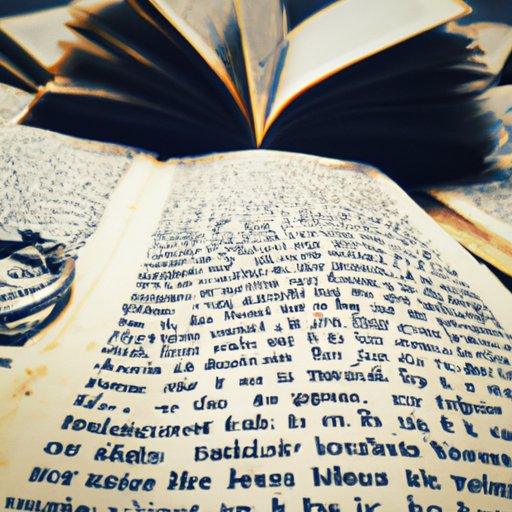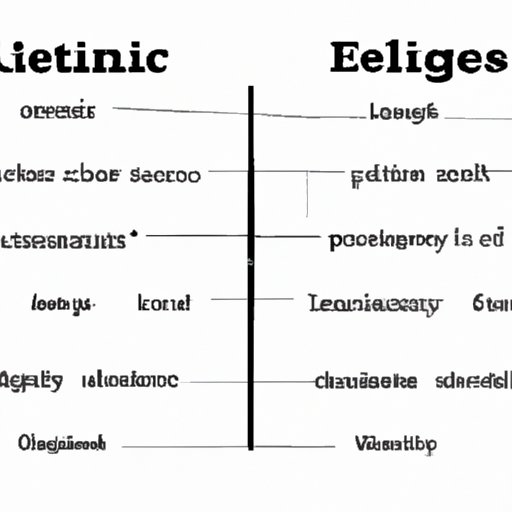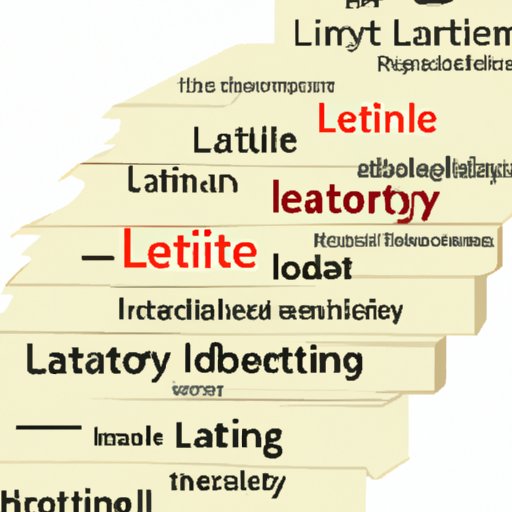Introduction
Literature is a vast and varied form of communication that has been used to entertain, educate and inspire for centuries. But what does literature really mean? This article will explore literature’s many meanings, looking at its various forms, historical significance, impact on society and role in language development.
Analyzing the Different Types of Literature and Their Meanings
When discussing the meaning of literature, it’s important to understand the different types that exist. There are three main categories: fiction, non-fiction and poetry.
Fiction
Fiction can be defined as “any narrative that is not based on fact or reality.” Fiction stories often contain elements of fantasy, science fiction, mystery and romance. The purpose of fiction is to take the reader on an imaginative journey, where they can experience different worlds and scenarios. Fiction can also be used to make social commentary, reflect on current events and explore moral dilemmas.
Non-Fiction
Non-fiction is the opposite of fiction, and is written about real people, places and events. It includes genres such as biography, history, travel and science. Non-fiction is often used to inform readers about a particular subject, and to provide insight into the human experience. Non-fiction can also be used to examine complex topics such as politics, religion and philosophy.
Poetry
Poetry is a type of literature that uses words to create a specific effect. Poems often have a lyrical quality, and use figurative language, imagery and sound to convey a message. Poetry can be used to express emotions, tell stories, and communicate ideas. It is a highly personal form of writing, and can be used to explore difficult topics such as love, loss and mortality.

Exploring the Historical Significance of Literature
The meaning of literature has evolved over time, and its importance in society has changed as well. Here, we will look at some of the key moments in literary history.
Ancient Texts
The earliest known examples of literature date back to ancient Mesopotamia and Egypt. These texts were often written in hieroglyphics or cuneiform, and contained religious and mythological stories. Ancient texts were used to pass down knowledge and preserve cultural traditions.
The Rise of Print Media
The invention of the printing press in the 15th century revolutionized the world of literature. Books became widely available and literacy rates increased dramatically. Writers began to explore new styles and genres, and literature became an important part of everyday life.
Modern Literary Movements
In the 19th and 20th centuries, literary movements such as romanticism, realism, modernism and postmodernism emerged. These movements sought to challenge existing conventions and explore new ways of expressing ideas. Writers began to experiment with form, genre and style, creating works that pushed the boundaries of literature and shaped the way we think about it today.
Examining the Impact of Literature on Society
Literature has had a profound influence on society, and its effects can still be seen today. Here, we will look at some of the ways literature has impacted our culture.
Education
Literature plays an important role in education. It provides students with an opportunity to explore different cultures, gain insight into different perspectives and develop critical thinking skills. According to a study by the National Endowment for the Arts, literature has been found to improve reading comprehension, increase empathy, and promote higher levels of academic achievement.
Artistic Expression
Literature has also been used as a form of artistic expression. Writers have used literature to explore themes such as love, loss, identity, morality and justice. Through their work, writers have given voice to those who are often unheard, and have shed light on issues that would otherwise remain in the shadows.
Social Change
Finally, literature has been used to effect social change. Many works of literature have challenged traditional norms and sparked conversations about important topics. For example, Mary Shelley’s novel “Frankenstein” was one of the first works to explore the implications of scientific advancements, while George Orwell’s “1984” has become a powerful symbol of totalitarianism.
Investigating the Role of Literature in Language Development
Language is constantly evolving, and literature plays an important role in this process. Here, we will look at how literature has shaped the development of language.
How Written Words Shape Language
Written language is one of the primary tools used to shape language. By recording words and phrases, authors are able to create new words, introduce new concepts and alter existing definitions. For example, Shakespeare is credited with inventing hundreds of words, including “bedroom”, “eyeball” and “swagger”.
How Literature Influences Speech
Literature also has a significant impact on the way we speak. Authors often use words and phrases that become part of our everyday vocabulary. For example, the phrase “all’s well that ends well” was first used by Shakespeare in his play of the same name, and is now commonly used in everyday speech.

Understanding How Literature Reflects Cultural Values
Literature is often reflective of the values and beliefs of a particular culture. Here, we will look at how literature reflects the ideologies and societal norms of a given time period.
Representation of Ideologies
Writers often use literature to explore different ideologies and world views. For example, dystopian novels such as “Brave New World” and “1984” explore the dangers of totalitarianism and the power of propaganda, while novels such as “To Kill a Mockingbird” and “The Great Gatsby” examine racism and inequality.
Reflection of Societal Norms
Literature can also be used to reflect the values and norms of a particular society. For example, in Jane Austen’s “Pride and Prejudice”, the importance of marriage and family is highlighted, while in F. Scott Fitzgerald’s “The Great Gatsby”, the shallowness of the wealthy classes is explored.

Comparing Literary Genres and Their Meanings
Finally, it’s important to understand the various literary genres and how they contribute to the meaning of literature. Here, we will look at three popular genres and their meanings.
Novels
Novels are usually long works of fiction that tell a story. They often explore themes such as love, loss, identity, morality and justice. Novels can be used to escape reality, explore different perspectives and gain insight into the human experience.
Short Stories
Short stories are usually shorter than novels, and often focus on a single event or character. Short stories typically explore a theme or idea in a concise and effective way. They can be used to explore complex topics, make social commentary and evoke emotion.
Essays
Essays are non-fiction works that explore a particular topic. Essays often use facts, research and arguments to make a point. They can be used to examine complex topics such as politics, religion and philosophy.
Conclusion
In conclusion, literature is a vast and varied form of communication that has been used to entertain, educate and inspire for centuries. It has had a profound impact on society, from influencing language development to sparking conversations about important topics. Literature has also served as a reflection of cultural values and beliefs, offering insight into different ideologies and societal norms. Ultimately, literature is a powerful tool that can be used to explore the human experience and gain a deeper understanding of the world around us.
(Note: Is this article not meeting your expectations? Do you have knowledge or insights to share? Unlock new opportunities and expand your reach by joining our authors team. Click Registration to join us and share your expertise with our readers.)
